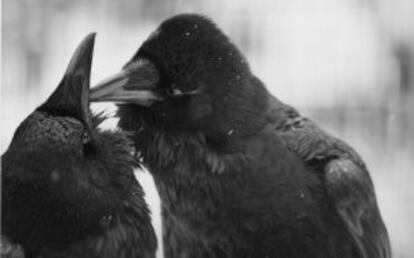Understanding the evolution of a birdbrain’s mind

Not too long ago, birds were seen as literal birdbrains, lacking the mental capacities of elephants, dolphins or great apes. But this view has changed rather dramatically within the last twenty years. We now know that during the course of evolution, higher intelligence did not only emerge in our own lineage. Like wings, eyes, and many other traits, intelligence developed whenever it was needed for survival. Corvids (crows, ravens and jays) and parrots are now well-known for their intelligence. But intelligence comes at a cost – a large brain consumes large amounts of energy – and, apparently, most species are successful without this burden. Therefore, scientists are very interested why a small number of animals, among them corvids, parrots, canids (dogs and hyenas), whales and primates, evolved higher intelligence. It seems that intelligence is particularly needed if living a socially complex life, as one needs to identify friend and foe, distinguish whom one can trust and when to rely on someone, and so on. The way you earn your living also matters, with some species using tools to obtain their food while others have to remember thousands of places where they hid their food.
The need for intelligence is only one side of the coin. Equally important – but much less investigated – is the nature of a species’ intelligence. For instance, Leonardo da Vinci is remembered as one of the greatest geniuses, who excelled as painter, sculptor, architect and innovator. In contrast, Albert Einstein was an ingenious physicist, but did poorly in mathematics. Hence, da Vinci possessed some sort of general intelligence, while Einstein was a specialist in a more narrow field of expertise.
Are apes, parrots, corvids and canids animalistic da Vincis or Einsteins? Traditionally, intelligence is tested in a species’ specific domain: a food cacher is tested for its capacities to remember cache sites and a tool-using species for its technical knowledge, but not vice-versa. Hence, we do not know if each species evolved specific skills in adaptation to their niche in life or if it possesses a “da Vinci”-like general intelligence.
For the case of a general or universal intelligence, highly intelligent species should all possess one standard type of “mental toolbox” containing the same tools. If, however, specific adaptations shaped the intelligence of individual species, then their toolboxes will contain different sets of tools – an “Einsteinian” form of intelligence. There are proponents of both hypotheses and to shed light on this question, our research group focuses on the two avian groups that are renowned for their intelligence: corvids and parrots. These two bird groups are only distantly related and have a widely independent evolutionary history. As a consequence, they obtained their toolboxes separately – as tool-users, food-cachers or vocal imitators. Species of the two groups were confronted with a number of standard tests to compare the tools in their mental toolboxes. For example, we asked ravens and keas (parrots from New Zealand) to find hidden food. We informed them where the food was not to be found but we did not tell them were the food really was; the ravens, as the specialists in detecting hidden food, used this information more efficiently than the keas. This is just a start towards an understanding of the birds’ minds, but it indicates that these birds are more Einsteins than da Vincis. Nevertheless, we should not draw final conclusions too early. It took science decades to recognize that we are not the only “brainy” animals, and only the future will tell us if our brainy fellows are geniuses in their own right, or if we are all just more of the same.
Tu suscripción se está usando en otro dispositivo
¿Quieres añadir otro usuario a tu suscripción?
Si continúas leyendo en este dispositivo, no se podrá leer en el otro.
FlechaTu suscripción se está usando en otro dispositivo y solo puedes acceder a EL PAÍS desde un dispositivo a la vez.
Si quieres compartir tu cuenta, cambia tu suscripción a la modalidad Premium, así podrás añadir otro usuario. Cada uno accederá con su propia cuenta de email, lo que os permitirá personalizar vuestra experiencia en EL PAÍS.
¿Tienes una suscripción de empresa? Accede aquí para contratar más cuentas.
En el caso de no saber quién está usando tu cuenta, te recomendamos cambiar tu contraseña aquí.
Si decides continuar compartiendo tu cuenta, este mensaje se mostrará en tu dispositivo y en el de la otra persona que está usando tu cuenta de forma indefinida, afectando a tu experiencia de lectura. Puedes consultar aquí los términos y condiciones de la suscripción digital.




























































